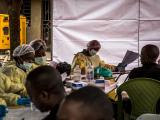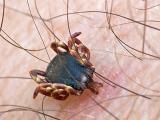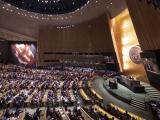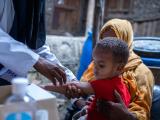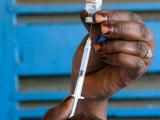The ongoing Democratic Republic of the Congo's (DRC's) Ebola outbreak has exposed the consequences of excluding pregnant and breastfeeding women from receiving a potentially lifesaving vaccine, which experts say is a health and fairness issue that applies to other infectious diseases.
To turn the tide, a multidisciplinary working group today formally released guidance on including pregnant women in vaccine development and deployment, which includes 22 recommendations aimed at policymakers, researchers, and global health groups.
The Pregnancy Research Ethics for Vaccines, Epidemics, and New Technologies (PREVENT) Working Group published the recommendations on its web site. The group, funded by Wellcome Trust, is a 17-member international team that includes experts in bioethics, maternal immunization, maternal-fetal medicine, obstetrics, public health, and vaccine research and policy. The group is based at the Johns Hopkins Berman Institute of Bioethics and the Center for Global Development, a nonprofit think tank based in Washington, D.C.
Carleigh Krubiner, PhD, one of the lead authors, said in a Johns Hopkins press release that the self-perpetuating cycle of excluding pregnant women from research and benefits of vaccination must end. "With global efforts now underway to develop a range of vaccines against devastating epidemic threats, we have to make sure pregnant women are on the agenda, so they will never again be left unprotected in the face of future outbreaks," she said.
Ebola outbreak exposes equity issues
The highly effective VSV-EBOV vaccine, made by Merck, has been successfully deployed in a ring vaccination strategy in the DRC, but pregnant and breastfeeding women aren't able to receive it, because it contains live virus, which typically isn't recommended for use in pregnant women.
A number of pregnant women have been infected in the current outbreak. In its latest update today, the World Health Organization (WHO) said at least 18 women infected in the outbreak were pregnant, and 7 more were breastfeeding or had recently delivered at the time of infection. Also, there have been 9 infections in babies younger than 1 month old.
In August, some members of the PREVENT working group penned a Stat commentary that said the decision not to vaccinate pregnant and lactating women against Ebola unfairly deprived them of protection and that the well-known impact of the disease on pregnant women outweighs limited information about the safety of the vaccine in pregnancy.
A few months later, the WHO Strategic Advisory Group of Experts (SAGE) on Immunizations examined what's known about use of the vaccine in pregnant women and said there isn't enough evidence for making a recommendation. SAGE members added, however, that health officials are collecting data on a small number of women who didn't know they were pregnant when they were vaccinated and said that local ethics committees may be taking up the issue.
Bold call for new default thinking
The PREVENT experts call for a major shift in thinking regarding pregnant women and vaccines in disease outbreaks in which the default should be to offer vaccines to pregnant women—not to exclude them.
The guidance sets out 22 concrete recommendations for more fairly including pregnant women in public health preparedness, starting from the ground up with basic research on maternal and fetal immune system function, to considering pregnancy use when planning vaccine development and investment, to allowing pregnant women to be part of clinical trials when the likely benefit of the vaccine outweighs the risk.
Specific target groups for each recommendation are noted with each item, including not only public health authorities and global health groups, but also researchers and key groups that help support vaccine development, such as the Coalition for Epidemic Preparedness Innovations (CEPI) and the US Biomedical Advanced Research and Development Authority (BARDA).
Other recommendations, for example, include evaluating pregnancy needs as early as possible during vaccine development, including maternal and neonatal health experts in decisions on excluding pregnant women, and including the perspectives of pregnant women themselves in making decisions on vaccine research and deployment.
Acknowledging the thorny issue of legal and financial liability when vaccines are studied in and offered to pregnant women, the group said mechanisms already in place to protect and incentivize vaccine developers and manufacturers should intentionally include the interests and needs of pregnant women.
Prospects for change
Krubiner told CIDRAP News that implementing some the recommendations will be challenging, especially the one calling for a shift away from the default of excluding pregnant women from receiving epidemic vaccines such as the one for Ebola. "It will require institutional change at every level—from the ground up and the top down," she said.
To seed the change and identify strategies to change the status quo, the group recommends that the WHO convene global stakeholders and experts to tackle the issue, Krubiner said. "This will help establish a new norm and ensure that our many recommendations to tackle the inequitable gaps in evidence and access to safe and effective vaccines among pregnant women can be implemented."
In the short term, some of the recommendations would be easier to implement, such as making sure surveillance systems capture data on pregnancy status and outcomes to better understand disease burden in pregnant women, she said. "It would be wonderful to be able to see these data reflected in situation reports and public databases for the range of active epidemics, such as Lassa fever and Ebola."
Krubiner said a group called Social Science in Humanitarian Action conducted interviews and focus groups with affected communities about the impact of Ebola on pregnant and lactating women, along with their views on vaccination.
"Importantly, they found that the women themselves are requesting vaccination, and many lactating women are choosing to stop breastfeeding in order to become eligible," she said.
"Pregnant women unfortunately don't have that option."
See also:
Dec 6 PREVENT guidance document
Dec 5 Johns Hopkins press release
Dec 6 WHO update on Ebola in the DRC
Aug 27 Stat commentary on Ebola vaccination





